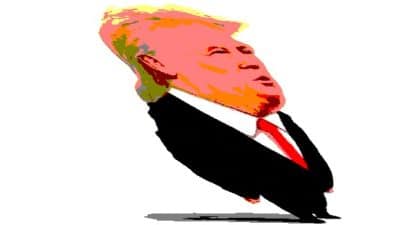Democrats are salivating at the prospect of being able to ride the wave of the political scandals involving Jack Abramoff and Duke Cunningham long enough that they can take back control of the United States Congress in the November midterm elections.
Don’t expect the wave to crash down on any Virginia Republicans running for re-election in the fall, however.
“It’s difficult for a member of Congress to face questions because of a scandal or because of word of the number of lobbyist-sponsored trips that he or she has taken if there isn’t somebody on the other side to drive that point home,” said Quentin Kidd, a political-science professor at Christopher Newport University.
And more often than not, there isn’t anybody on the other side to offer even token competition for congressional incumbents in Virginia. Kidd said there were just five races featuring a Democrat and a Republican running against each other for a congressional seat in the Old Dominion in the 2004 election cycle – among the 11 seats in Congress up for grabs in the state.
In 2002, the number was four, and in 2000, it was six.
This trend isn’t limited to Virginia, Kidd told The Augusta Free Press – one analysis of the 2004 election cycle showed that only 121 of the 435 seats in Congress featured serious two-party competition, “and if you were to ask the parties, my guess is that they would only consider maybe 30 of those truly competitive,” Kidd said.
This could leave salivating Dems drowning in their spittle, in a manner of speaking.
“The problem that Democrats face is the lack of competitive races nationwide,” said Ed Patru, a spokesman for the National Republican Congressional Committee, which is heading up efforts to protect the standing GOP majority in the House of Representatives.
Patru pointed to a report by independent political analyst Charlie Cook that showed 28 actual competitive races in the 2004 election cycle. For Democrats to take control of the House, they would have to win 90 percent of those seats in competitive districts currently held by Republicans, according to the analysis.
None of those districts is in the Commonwealth – where the Abramoff and Cunningham scandals could have otherwise made vulnerable at least one prominent Virginia congressman, Virgil Goode in the Fifth District, whose involvement in a controversial Southside development deal involving a defense contractor was clouded by revelations that he had accepted nearly $90,000 in campaign contributions from the contractor’s PAC and its employees.
“Virgil Goode can be elected as a Democrat, a Republican, an independent, whatever he decides to call himself. He’s proven that. He has such a strong personal following in his district that I think it’s going to take something much bigger than this to make him electorally vulnerable,” said Mark Rozell, a political-science professor at George Mason University.
Goode will face a Democratic Party opponent in the fall – likely to be Al Weed, a Nelson County farmer who challenged Goode in the 2004 election cycle and received 36.3 percent of the vote.
Weed said he doesn’t plan to make scandal the centerpiece of his campaign. But that said, he has seen something of a change in the mindset of voters in the Fifth District in his early trips on the campaign trail.
“I don’t find in campaigning a willingness from people to say, ‘Virgil’s my man. I’m not interested in talking,’ ” Weed told the AFP.
“I don’t know how that will translate to votes. I mean, everybody knows all the MZM stuff. Everybody knows that the Republicans have fallen into this mess of corruption up there. Everybody knows that it comes from the arrogance of power. But it depends on where you come from politically. If you’re a diehard Republican, you can kind of excuse it by saying, ‘Well, it was our turn,’ ” Weed said.
“I think, though, on balance, that what it does, the whole issue of scandals, and not only where Virgil has been involved, is it takes away from the whole ‘he’s one of us, he’s a good old guy,’ and puts him in the same boat as all those politicians up in Washington,” Weed said. “And so then when you start asking people, ‘What has he accomplished?’ – that becomes a more meaningful question. Because before, he was one of us, he’s friendly, he goes to everybody’s funeral, he’s our guy, but now they’re not so willing to make that connection.”
Another race in which scandals are sure to take center stage is the U.S. Senate contest expected to pit incumbent Republican Sen. George Allen and Democrat Harris Miller. Allen was in the headlines last month for initially refusing to return contributions from Abramoff and Abramoff clients, then reversing course and donating the monies that he received from the lobbyist to charity.
“We’ll be highlighting the corruption issue as part of a larger pattern of issues related to how Washington is broken,” Miller campaign spokesman Brian Cook told the AFP.
Even with the attention coming from the Miller side, though, the scandal would be expected to make only a minor impact on Allen’s campaign, Rozell told the AFP.
“Even if he had a really strong challenger, his support in the elections would be affected marginally, at best, by this issue,” Rozell said. “For the most part, it might put him on the defensive against a challenger, and take him a little bit off message. But I don’t think that there are a lot of voters who are looking at this as the primary criteria for deciding whether to re-elect George Allen.”
Whether or not voters nationwide will look at the Abramoff and Cunningham scandals when considering their voting choices is anybody’s guess right now.
“The numbers are very bad for the Republicans nationally – by a margin of three to two, voters say that they want Democrats running Congress, not Republicans. And those numbers are the kind of numbers that Democrats had in 1994 when Republicans picked up 50 seats,” University of Mary Washington political-science professor Stephen Farnsworth said.
“So there may be some effect nationally. This scandal actually has the potential to be a very big deal. You have every 20 years or 30 years or so a wave of corruption prosecutions. This could be as big as Abscam. But it’s hard to tell how big this is until things play out a little bit more,” Farnsworth told the AFP.
“Scandals can take on a life of their own, and it can be hard to predict where the momentum might go,” Kidd said. “For example, if Democrats are successful in nationalizing the 2006 midterm elections, as they are clearly going to try to do, and if they are successful in their attempts to tie the Abramoff and Cunningham scandals to issues with mismanagement with regard to Katrina and the war in Iraq, there could be some Republicans who could be dragged down enough to lose their seats.”
“I think it will at least hurt the Republicans’ margins in the elections this year,” Rozell said. “Maybe they’re a little bit protected by the reality that the elections are not for another 10 months or so, and therefore they have a chance to shift the discussion to other issues between now and then. But there is a lot of talk about whether there will be a party-leadership change in November.
“I think if all the talk is about scandal and influence peddling by lobbyists, and the economy takes a downturn between now and Election Day, then we could be talking about really serious losses for the GOP this year,” Rozell said.
(Published 02-06-06)










